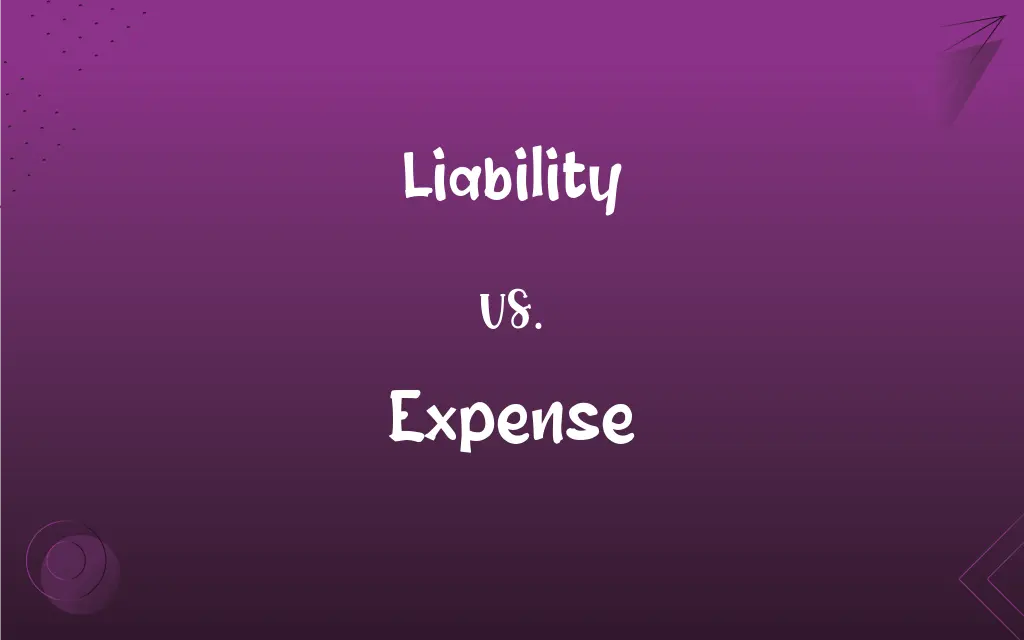Liability vs. Expense: What's the Difference?
By Janet White || Published on December 2, 2023
A liability is an obligation or debt a company owes, while an expense is a cost incurred in the process of generating revenue.

Key Differences
Liabilities refer to financial obligations a business owes to external parties, like loans or accounts payable. On the other hand, expenses are costs incurred by a business during its operations, like rent, utilities, or salaries.
Liabilities are recorded on a company's balance sheet and represent future outflows of economic benefits. Expenses, recorded in the income statement, reflect the consumption of assets or services in the generation of revenue.
Liabilities can be long-term (like mortgages) or short-term (like accrued expenses), whereas expenses are typically immediate costs recognized when incurred and are tied directly to business activities.
The payment of a liability can result in an expense, but liabilities themselves are not expenses. While, expenses, once incurred, reduce a company's net income, but liabilities represent future payments.
Managing liabilities involves long-term financial planning and impacts a company's liquidity and solvency. Managing expenses is about operational efficiency and directly affects profitability.
ADVERTISEMENT
Comparison Chart
Definition
Financial obligation or debt owed
Cost incurred in generating revenue
Financial Statement
Recorded on the balance sheet
Recorded on the income statement
Nature
Represents future outflows
Reflects current or past consumption
Duration
Can be long-term or short-term
Typically tied to immediate or ongoing operations
Impact
Affects company's liquidity and solvency
Directly influences profitability
ADVERTISEMENT
Liability and Expense Definitions
Liability
Liabilities include loans, mortgages, and accounts payable.
The total liabilities include all outstanding payments to suppliers.
Expense
Expenses include costs like rent, utilities, and salaries.
The monthly rent for the office space is a significant expense.
Liability
A financial obligation or debt owed by a company.
The company's bank loan is listed as a liability on its balance sheet.
Expense
A cost incurred in the process of generating revenue.
Salaries paid to employees are recorded as an expense.
Liability
Represents future economic outflows.
The accrual of unpaid salaries is a current liability.
Expense
Directly affects a company's profitability.
Controlling expenses is essential for maintaining profit margins.
Liability
Impact a company's liquidity and solvency.
Reducing liabilities is crucial for improving the company's financial health.
Expense
Recorded on the income statement.
Marketing and advertising costs are listed as expenses.
Liability
Recorded on the balance sheet.
Long-term liabilities, like bonds payable, affect the company's financial position.
Expense
Reflects the consumption of assets or services.
The depreciation of equipment is an expense reflecting its use.
Liability
The state of being liable.
Expense
Something spent to attain a goal or accomplish a purpose
An expense of time and energy on the project.
Liability
Something for which one is liable; an obligation, responsibility, or debt.
Expense
A loss for the sake of something gained; a sacrifice
Achieved speed at the expense of accuracy.
FAQs
What is a liability in accounting?
A liability is a financial obligation or debt owed by a business to others.
How is a liability recorded in accounting?
It's recorded on the balance sheet as an obligation that the company needs to settle.
Is accounts payable a liability?
Yes, accounts payable is a short-term liability.
Can liabilities be non-financial?
Typically, liabilities are financial, but they can include other obligations like service or product warranties.
Do liabilities always involve cash payments?
Mostly yes, though they can sometimes be settled through other means like goods or services.
Are all liabilities long-term?
No, liabilities can be short-term (like accounts payable) or long-term (like bank loans).
How do liabilities affect a company's financial health?
High liabilities can indicate financial stress, but they can also signify healthy growth and investment.
Are taxes considered a liability?
Yes, taxes payable are a current liability.
What's the difference between a liability and an expense?
A liability is an obligation to pay in the future, while an expense is a cost already incurred.
Can a company operate without liabilities?
It's rare and difficult, as most businesses have some form of liabilities like loans or payables.
What is an expense in accounting?
An expense is a cost incurred in the process of generating revenue.
What's the difference between an expense and a loss?
An expense is a cost from normal operations, while a loss is from extraordinary or non-operational events.
Are salaries and wages an expense?
Yes, they are operating expenses.
How is an expense recorded?
Expenses are recorded on the income statement and reduce net income.
Is rent an expense?
Yes, rent is considered an operating expense.
Are all expenses paid immediately?
No, some expenses may be accrued and paid at a later date.
Is depreciation an expense?
Yes, depreciation is a non-cash expense that represents the wearing out of assets.
How do expenses impact profit?
Expenses reduce profit since they are subtracted from revenue to determine net income.
Can a cost be both a liability and an expense?
Yes, it first enters as a liability (when incurred but not paid) and becomes an expense when paid.
How are expenses managed in budgeting?
Expenses are estimated and monitored in budgeting to ensure efficient use of resources and profitability.
About Author
Written by
Janet WhiteJanet White has been an esteemed writer and blogger for Difference Wiki. Holding a Master's degree in Science and Medical Journalism from the prestigious Boston University, she has consistently demonstrated her expertise and passion for her field. When she's not immersed in her work, Janet relishes her time exercising, delving into a good book, and cherishing moments with friends and family.

































































